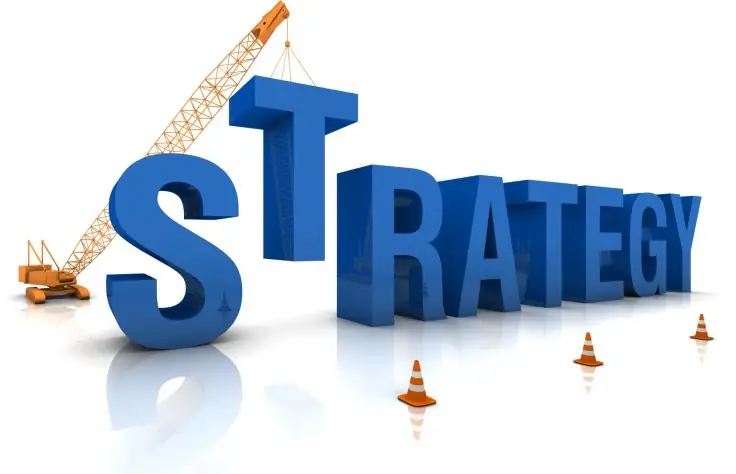2026 Author: Howard Calhoun | calhoun@techconfronts.com. Last modified: 2025-01-24 13:10:26
Strategy consulting (SC) is often referred to as strategy consulting, strategic advisory or consulting advice. This concept is considered by most consultants as the most "elite" and prestigious segment in the professional services industry. Strategy is defined as a plan to achieve the organization's long-term objectives. All major firms regularly interact with consultants to develop and implement business ideas.
Strategy consulting aims to support large business clients to develop corporate, organizational or functional strategy and assist public sector institutions in economic policy.
A Brief History
The first strategy company was founded in 1886 by Arthur Degon Little, an MIT chemist, followed by others who gradually institutionalized the consulting industry.

Although Arthur Little discovered this direction in business management, he refused to follow the general global trend further,which began to develop on homogeneous standard solutions, which contradicted the opinion of the author. He was categorically against any systematization and sought to come up with a unique solution in each case, so he refused to join a professional association for strategic development consulting.
Ultimately, his strategy stopped developing. Unlike other companies that took much less risk for themselves by transferring ideas from one organization to another. In fact, the profession grew out of homogeneity, not innovation.

The next stage of development is related to DuPont. For a long period of time, DuPont had a monopoly on explosives in the US. When the war ended, the company had to think about other products and markets. They decided to apply their technology to chemical products (such as nylon) and paint products. To organize new productions, DuPont took the opportunity to solve the problem with the help of a special departmental structure, since the existing consulting firms of that time could not solve the reconstruction issues. This experience later expanded to other major strategic consulting centers such as GM and Standard Oil.
Consulting companies such as McKinsey or Booz Allen Hamilton have also taken an interest in this more successful model. Since the 1930s, most of the activities of such corporations have been devoted to the introduction of experience in various industries.
Then James McKinsey,who ran the McKinsey firm in the 1930s, introduced some very bright ideas into manufacturing. He launched a survey, an interview with company managers using a questionnaire. He also rationalized the firm's commercial approach. Martin Bauer, his successor, has gone one step further by developing a new recruitment and cultural adaptation method for employees.
McKinsey has set up a strategic consulting system for the company, one for sales and one for serious, stereotypical consultants. The company was far less successful, but in the long run, McKinsey was the right choice. Unlike its competitors, McKinsey has contracted with large business clients such as diamond giant De Beers.
From the 1940s to the 1960s, consulting firms contributed greatly to the growth of the "multi-family" structures that are the backbone of large financial groups today. Consultants have become very active in spreading this model in Europe. By the end of the 1960s, the company had a base in the UK. From the mid-1960s, centers began to sell strategy, not structure. By the end of the 1980s, consultants were playing an entirely new role in firms.
An example of strategic consulting for that time was the Boston Consulting Group. This company was commissioned by the British government in 1975 to study the future of the motorcycle industry in the UK. The results exceeded all expectations, national firms saw their sales drop, mainly due to Honda taking over the US market.
A new trend has emerged inUSA in the 1980s, when a series of legal laws included managerial liability. Insurance fees due to possible management errors exceeded all possible volumes. Subsequently, firms were forced to turn to management reviews to give legitimacy to the decisions of their managers, and the consulting market rushed forward again.
World market

In 2011, the market for strategic consulting services was estimated at $26.5 billion (approximately 1.8 trillion rubles). After the crisis years, global growth has been slow due to the recovery of the US and European markets, which together represent the vast majority of the world's industry. Since 2014, the strategic consulting industry has been rising at a growth rate of 4.7% in 2015 and 5.8% in 2016, and was valued at over $30 billion in 2017. This type of consulting occupies about 12% of the total volume of the entire industry, which is equal in volume to HR consulting.
The development of the IC industry is closely linked to the overall global economic growth. Thus, during periods of prosperity of the industry, its high growth was observed, and, on the contrary, a decrease in growth rates was recorded during the general recession of the economy. Strategic management consulting consists of eight disciplines:
- Corporate strategy.
- Business model transformations.
- Economic policy.
- M&A.
- Organizational strategy.
- Functional strategy
- Strategies and operations in the digital sphere.
Corporate Theory

This method, also called strategic management, involves setting strategies and goals for business units. Consultants in this area are regularly engaged to support, in particular, the development of strategic planning in consulting. Common examples of such consulting projects include evaluating options, supporting business planning processes, and developing growth programs as companies enter new regions or launch new products.
Similar to corporate strategy, firms focus on developing forward-looking strategies for fundamental changes in business practices brought about by major changes in the external environment. In addition, business model transformation has a broader scope than strategic consulting, which means that it can be applied to a range of organizational and operational elements to achieve a common goal.
These list includes price offers, customer segments, cost structures and organizational structures. Due to the disruptive nature of technology in recent years, the consultants who support the work of BMI are in many cases working at the interface between digital design and IT strategy.
Economic Policy Service Area

It includes a range of economic advisory services that support government and international policy agencies. Most of the proposals cover fiscal policy, whichconcerns government actions regarding taxation, budgets and spending, and monetary policy. It also considers Central Bank actions regarding the money supply and interest rates, or government interventions in areas such as the labor market, national property, housing, etc.
Further offerings within the segment include impact assessments such as socio-economic benefit studies, financial assessment analyzes in cases of economic disputes, economic studies for antitrust or competition investigations, and merger procedures conducted for both corporations and power.
Strategic advisors, along with corporate finance advisors, mergers/acquisition lawyers and investment bankers who are also active in these matters, focus on strategic and commercial activities in the pre-deal phase. Strategic consulting centers serve companies and investors, for example, in building business cases to understand the economic drivers of mergers or acquisitions and further support clients with due diligence on potential targets.
Other areas in which advisors can play a role in M&A include supporting alliances and joint ventures, managing disposals and developing Initial Public Offerings (IPOs).
Organizational lever of enterprise development

Organizational strategy considers the levers that an organization must manage in order to implement the strategy of the enterprise over time. First of all, proposals include the design of organizational structures and corporate governance, assessment of organizational competitiveness, etc. Functional strategy includes the development of strategic plans for organizational functions, which can range from sales and marketing to finance, HR, supply chains, R&D or purchasing.
Over the past decade, strategic management and operational management have become more and more intertwined. As topics such as process, operations and technology management become more and more important elements of implementation. Consequently, several offerings that have historically centered around strategic consulting have been expanded to reflect operational considerations, and as a result, the area of strategy and operations has grown in importance.
The domain caters not only to consulting firms who have moved into operations, but also to operations professionals and increased their skills and large technology firms. In the future, the lines between strategy, operations and technology are expected to become even more blurred.
In line with the development of technology, digital strategies have come to the forefront of strategic work. They contribute more than ever to success, which is why they have recently shown unprecedented growth. The service area combines the elements of the strategy and the IT organization andcovers offerings such as developing a strategy for digital operations, developing an enterprise IT or online strategy, developing analytics approaches, adopting cloud technologies, and enabling high-level application architecture and management.
Comparison of management practices

Strategic and management consulting have significant differences. Companies seek outside advice and support when faced with any kind of challenge and turn to management consulting. Professionals who provide external advice are called management consultants. Management consulting is a general type of this activity. This is a basket for other smaller specializations such as HR consulting, finance consulting. Organizations not only benefit from external advice by choosing management consulting, but also gain access to specialized expertise.
Strategy consulting is the practice of highly experienced consultants providing advice to companies on their goals and future direction, suggesting profitable tactics to accelerate growth and add value to the business. These consultants use experience, industry wisdom and analysis to help their clients find strategies that will increase revenue and market share while improving their competitive edge. The two species are related, so they don't have many differences. Here are some of them:
- Strategicconsulting tends to be directed more towards executives and board of directors, large organizations and government sectors, while management consulting is carried out at lower levels of corporations and in small organizations.
- Consultants specialize in issues that focus on specific business issues, while management consultants work on broad business issues.
- Strategic and management consulting is carried out in companies of different levels. Management consulting is carried out in large, medium and small organizations, in contrast to strategic consulting, which is mainly carried out only in large organizations.
Prospects for the development of companies

IC is a part or special area of classical management consulting. On the one hand, SC is the company's expectation of changing framework conditions such as technology, markets and laws. On the other hand, strategic advice also relates to the respective goals of the company, which may include, but are not limited to, continuing to exist, consolidating certain market positions, or seeking a possible return on capital. Typical tasks of the IC include review, further development of new directions, concepts and measures to improve and develop a business model.
Review includes consideration of the current position, which is always strategic and from which the company makes relevant decisions. If the position is chosen subconsciously orunconsciously, this does not necessarily lead to optimal development and market positioning.
The analysis of this position is the task of strategic consulting. Cases may include negative events, reorientation of the company or individual business sectors. In addition, the QC is linked to the subsequent adjustment process. It is based on analysis and is necessary because of external and internal changes. Examples include changing interest rates, refocusing sales, and the emergence of new technologies. The need for such consultants in the UK increases especially in cases where the company is newly created, merged or there is a change of ownership.
Procedure, specific characteristics and requirements
SK basically follows the general pattern of consulting projects. Based on the assessment of the situation, options for action are developed, researched and selected. The implementation of the selected option is carried out, later it is accompanied and supported by the implementation in the company. Specific characteristics and requirements are due to the complexity of strategic issues.
Refining the strategic level and focus of a project involves adjusting the level of strategy during the acquisition phase. If questions of different levels arise at the same time, the procedure for their consideration is agreed with the client. The mental hierarchy indicates that in such cases the company or group level takes precedence over the business and functional levels.
Developing a strategy requires corporate goals. Therefore, consulting implies a fundamental clarification of these goals, and often theirreformulation in dialogue with management prior to the final definition of the project. This process can be repeated in practice if the target correction makes sense because of the strategically relevant information. From the point of view of the consultant and the project manager, it is necessary to quickly gain clarity about the existing or required information base. Key information compiled, checked for relevance and combined with a description of the situation. Any misinterpretations should be corrected at an early stage. In agreement with the client, a common knowledge base is created for strategic analysis.
The methodological competence of the consultant is used in the stage of analyzing the strategic starting point. Against the background of the company's position, strategic approaches are developed in the form of action plans. The consultant and the project leader are responsible for gathering existing ideas, presenting new ideas, and supporting the generation through appropriate activities such as brainstorming workshops. The innovative content of the future strategy is explained at this stage of the project.
The responsible decision in favor of the strategic option lies with the management of the company. However, the consultant must be prepared to be able to make recommendations and justify them in terms of quantity and quality. In any case, it must ensure systematic decision-making. This primarily includes a financial assessment of each alternative, such as in the case of a business strategy in the form of a business plan.
List of consulting services

Services of strategicconsulting services adapted to most common service lines of business planning, strategy and succession:
- Conflict management.
- Budgets.
- Competitive analysis.
- Market analysis.
- Service development.
- Calculating cost or potential selling price.
- Initial draft and structure of the sales contract.
- Navigation consulting on the pitfalls and dangers of selling a company.
- Analyze cost or asking price for goods and services.
- Marketing and sales, including e-commerce.
- Marketing plans.
- Marketing audits.
- Analysis of the market for strategic consulting services for large companies.
- Service development.
- Restarting the service.
- Advertising plans.
- Advertising audits.
- Pricing analysis.
- Competitor analysis.
- Web page analysis including usability.
- Design updates, search and optimization strategies, and web advertising strategies.
- Risk assessment.
- Review and audit of the risk management system.
- Developing a risk management system.
- Evaluate or develop a safety manual.
- Risk and security training.
Features of the Russian market
Despite the fact that strategic consulting in Russia has all the features of a young market, it is developing very powerfully. The main development trends can be noted:
- Increase in the level of trust in consultants due towhich increased the demand for SC from large and medium-sized firms. This is primarily due to the fact that competition in the sectors of the economy is increasing, and firms need to research and develop new solutions to increase efficiency. Consulting consultants are engaged to develop these solutions.
- Competition in the expensive price sector. Supply growth is far ahead of demand. Most of the large Russian firms already have experience of cooperation with consulting companies and have permanent suppliers of these services, others resort to various tricks (term limits, dumping) for long-term relationships and choosing another consultant.
- Due to the rise in competition and the emergence of price confrontation at tenders, prices for SK are lowered.
- The emergence of demand in large firms. The newest firms that do not know how to interact with consultants are implementing their plans with the involvement of international consulting firms.
Thus, it can be argued that there are great prospects for the formation of the insurance company in Russia, both in terms of growth in sales and the number of firms, and in terms of the quality of services provided.
Strategic consulting and company rating 2018 is presented in the photo in the article.

Digital strategies support the market by creating IT strategies, providing plans to integrate technology into business strategy, and enabling business functions. They are well positioned to implement systems and toolsand high-level IT architecture.
Analysts distinguish between two types of firms in the Russian market:
- clean play consulting organizations;
- “strategic practices” of multi-service companies with a service line of a universal consulting firm providing related services.
Thousands of organizations around the world provide this kind of strategy services, but the ranking of strategy consulting firms depends on the global reach and reputation of firms operating at the top of the market.
Recommended:
The strategic planning process includes Steps and basics of strategic planning

To a large extent, a company's success in the market is determined by strategic planning in the organization. As a method, it is a step-by-step study and technique of executing a procedure aimed at theoretical and practical construction of a model of the company's future. A clear program for the transition of an organization or enterprise to an optimal management model in market conditions
Strategic alliances are an agreement between two or more independent firms to cooperate to achieve certain commercial goals. Forms and examples of international strategic alliances

Strategic alliances are an agreement between two or more parties to achieve a set of agreed goals while maintaining the independence of the organizations. They tend to fall short of legal and corporate partnerships. Companies form an alliance when each of them owns one or more business assets and can share business experience with each other
Strategic planning and strategic management. Strategic planning tools

A novelty of strategic planning and management management of closed forms of company development is the emphasis on situational behavior. This concept opens up more opportunities to prevent external threats and develop mechanisms for protecting against risks in a market environment
Management consulting. Consulting - what is it? Types of consulting

The rapid development of innovative technologies, which has not bypassed sales markets, as well as the wishes and requirements of customers - all this and much more makes companies and organizations constantly keep up with the times. What is management consulting? This and many other concepts are discussed in detail in this article
Consulting - what is it? What is management and financial consulting?

Modern market relations and technologies are rapidly developing. In an environment of high competition and growing consumer demands, it is very difficult to adapt in a timely and productive manner, to change a business strategy. Consulting - what is it? Why are tens of billions of dollars spent annually on it?

